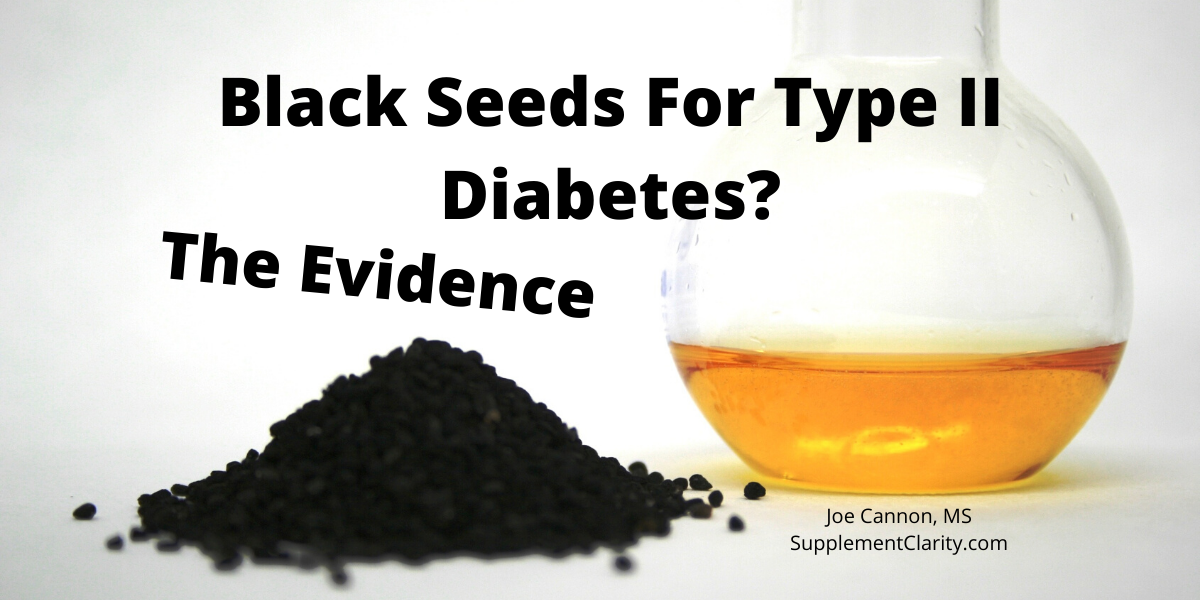Black seeds (Nigella Sativa) is rumored to cure everything except death. That's a powerful reputation but what about individual conditions like diabetes. Can black seeds reverse type II diabetes by lowering blood sugar and hemoglobin A1C levels? In this quick video, You will see human clinical evidence. This will help you cut through the hype and let you know if black seeds help -and how much might help. I also share my thoughts on one quality supplement worth taking a look at. Also, see the other reviews on black seed too.
Video Review: Black Seeds For Diabetes
Black Seed Questions and Answers
How Much Works
Studies show about 1-2 grams per day. Two grams might be closer to the sweet spot. There's no need to use more than 2 grams per day. Since a teaspoon has about 4 grams, this comes to about 1/4 to 1/2 teaspoon per day. The seeds can be sprinkled on salads or mixed in yogurt or in smoothies. If you prefer, the seeds can be ground into a powder using a coffee grinder or food processor.
Black Seed Powder vs. Oil?
Use the black seed powder and not the oil. The research involved powdered supplements, not black seed oil supplements.
Do Black Seeds Cure Diabetes?
There is no evidence of this. Don't believe any “expert” who says otherwise. Nigella Sativa may be a part of diabetes blood sugar management but there is no proof that taking supplements or using the powder by itself will reverse diabetes. The best way to reverse diabetes is with weight loss, eating better foods (watching those simple carbs) and exercise.
Any Black Seed Side Effects?
Black seeds generally don't have many negative side effects so when in doubt, it's always wise to start new supplements you take with less than recommended for the first week, to see how you might respond. For example, don't start with 1/2 a teaspoon. Start with maybe 1/4 or less and see what happens.
- Because they seem to lower blood sugar, if you take diabetes medications like metformin, black seeds + medications may cause your blood sugar to go to low. This can lead to hypoglycemia, which is bad. Because of this, black seeds should be used by diabetes under the supervision of their doctor to minimize any side effects you personally may experience.
- Do not use black seeds while pregnant. Talk to your doctor first if breastfeeding.
- There's not much known about drug interactions, so if you take any medications like blood thinners, for example, run all this past your doctor and pharmacist first.
- Stop taking black seeds at least two weeks before having surgery
See the big review on black seeds for more side effects
I Don't Like Swallowing Supplements
There are black seed powdered supplements. For those who don't like swallowing capsules, open them up and use the powder inside. You can mix the powder in yogurt or mix with juice or a smoothie or sprinkle on your breakfast, lunch or dinner. Another option is to use the seeds themselves. They can be eaten with food or ground into a powder and used the same way as powdered supplements.
What's The Best Supplement To Use?
There no studies that compare brands to each other. While most brands are probably similar to each other, Here is the product I investigated and think is worth taking a look at.

Joe – do you grind up the seeds or toast them ahead of time or just put them in a smoothie as is and use a teaspoon?
Judy you can do either. You can put them in smoothies or grind them up in a coffee grinder /food processor and use them that way. For blood sugar lowering the evidence is for 1/4 to 1/2 teaspoon but if you’re just using them for general health reasons, there’s no set amount and a teaspoon is probably fine